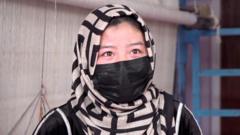As the Taliban's restrictions persist, girls in Afghanistan are adapting to the harsh realities of life by engaging in the carpet weaving industry, a rare avenue for employment in a collapsing economy.
Afghan Girls Find Work in Carpet Weaving Amid School Bans

Afghan Girls Find Work in Carpet Weaving Amid School Bans
With education opportunities stripped away, young Afghan women turn to low-paid carpet weaving to support their families.
In Kabul, countless women and girls fill small workshops, weaving carpets as their only lifeline to economic survival since the Taliban's rise to power in 2021. Among them is 19-year-old Salehe Hassani, who laments, “We girls no longer have the chance to study… so we turned to the workshop.” The Taliban's ban on girls' education for those over 12, coupled with a reduction in women’s workforce participation—which already stood at a mere 19% in 2020—severely limits job prospects.
The dire economic situation has pushed these women into the carpet weaving industry, one of the few sectors permitted by the current government. The UN estimates that between 1.2 to 1.5 million Afghans rely on this industry, with women making up about 90% of the workforce. Despite the reported boom in carpet exports, which exceeded $8.7 million in the first half of 2024, the weavers see little of the profits from their labor.
Workers typically earn around $27 for each square meter of carpet, putting them at below a dollar a day, even as they endure long hours—often exceeding 12 hours. Nisar Ahmad Hassieni, who manages several weaving workshops, claims to pay his employees more fairly, at around $39 to $42 per square meter, and strives to support those affected by the Taliban’s educational closures.
As girls like Shakila, who once dreamed of becoming a lawyer, now find themselves in the weaving workshops alongside their sisters, a focus on survival has taken precedence. Their father's harsh decision to withdraw his daughters from school was motivated by safety concerns after deadly bombings at their former school, an experience that left Shakila's sister Samira deeply traumatized.
Despite the grim circumstances, the resilient spirit among the young women shines through. Salehe, for instance, has been secretly studying English, determined to continue her education. "One day," she proclaims, "I plan to become a leading doctor and build the best hospital in Afghanistan." The future remains uncertain for Afghan women, but their resolve to keep learning and aspiring to greater heights persists in the face of adversity.






















